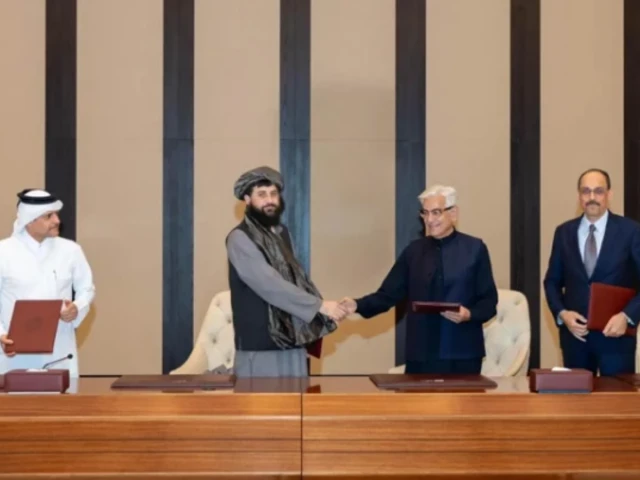Pakistan and Afghanistan agreed to an immediate ceasefire during talks in Doha, the two sides announced on Sunday, after a week of violent border clashes, the worst violence between the South Asian neighbors since the Taliban seized power in Kabul in 2021.
The ceasefire “has been finalized,” Pakistani Defense Minister Khawaja Muhammad Asif said on X on Sunday, saying the two sides would meet again on October 25 in Istanbul to discuss “detailed issues.”
Pakistani delegation, led by Khawaja Asif, including other senior officials. On the Afghan side, the negotiations were led by Acting Defense Minister Mullah Yaqoob, accompanied by other representatives.
Pakistani officials have raised the issue of cross-border terrorist attacks originating from Afghanistan, particularly singling out groups such as the Gul Bahadur faction and the Tehreek-e-Taliban Pakistan (TTP). Islamabad says these groups have been involved in multiple deadly incidents in Pakistan in recent months.
Sources close to the negotiations said Pakistan had presented a “one-point agenda” focused on dismantling terrorist networks. “Pakistan has made it clear that the Afghan government must eliminate terrorist organizations and their hideouts,” sources said.
Taliban spokesman Zabihullah Mujahid said in a statement that the parties had agreed to a comprehensive and meaningful ceasefire.
Read: Pakistan urges Afghanistan to eliminate terrorist sanctuaries during Doha talks
Qatar’s Foreign Ministry, which mediated Saturday’s negotiations with Turkey, said the follow-up meetings aimed to “ensure the sustainability of the ceasefire and verify its implementation in a reliable and sustainable manner.”
Militant attacks and airstrikes
Pakistan and Afghanistan are seeking a way forward after clashes left dozens dead and hundreds injured. The talks were led by Asif and his Afghan counterpart, Mullah Muhammad Yaqoob, both sides said.
Ground fighting between the former allies and Pakistani airstrikes across their disputed 2,600 km (1,600 mile) border were sparked after Islamabad demanded that Kabul rein in militants who had stepped up attacks in Pakistan, saying they were operating from safe havens in Afghanistan.
The Taliban refuses to grant sanctuary to militants to attack Pakistan and accuses the Pakistani military of spreading false information about Afghanistan and harboring militants linked to the Islamic State to undermine its stability and sovereignty. Islamabad denies these accusations.
Militants have been waging a years-long war against the Pakistani state with the aim of overthrowing the government and replacing it with their strict model of Islamic governance.
A suicide bombing near the border killed seven Pakistani soldiers and wounded 13 others on Friday, security officials said.
“The Afghan regime must rein in proxies who have sanctuaries in Afghanistan and are using Afghan soil to carry out heinous attacks inside Pakistan,” Pakistan Army Chief Field Marshal Asim Munir said at a cadet graduation ceremony on Saturday.
Learn more: More than 200 Afghan soldiers killed
The Taliban spokesperson said that during the Doha negotiations, “it was decided that neither country would take hostile actions against the other and that no support would be given to groups acting against the government of Pakistan.”
Tensions escalate after unprovoked shooting by Afghan Taliban regime
Tensions along the Pak-Afghan border escalated last week when clashes erupted after the Afghan Taliban regime opened unprovoked fire on several locations in Khyber-Pakhtunkhwa (KP) and Balochistan, provoking a swift and forceful response from the Pakistani army, which destroyed several Afghan posts and killed civilians. dozens of Afghan soldiers and militants.
The coordinated assault began in several key areas including Angoor Adda, Bajaur, Kurram, Dir, Chitral in Khyber-Pakhtunkhwa and Baramcha in Balochistan. According to security sources, the firing was aimed at facilitating the illegal entry of Khwarij – the state term for the banned Tehreek-i-Taliban Pakistan (TTP) – into Pakistani territory.
“The Pakistani army reacted immediately and decisively,” security sources said. “The counter-offensive effectively targeted and destroyed several Afghan posts on the border. Dozens of Afghan and Khwarij soldiers were killed in retaliatory fire.”




